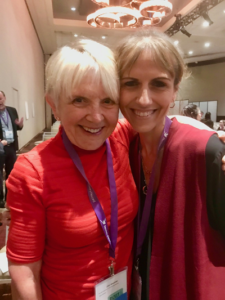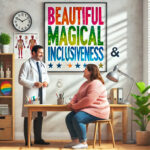Recognition that ‘experience’ experts can help ED recovery
Recognition that ‘experience’ experts can help ED recovery

Today’s picture: June Alexander and Shannon Calvert, following their participation with Dr. Anthea Fursland and Professor Stephen Touyz, in an AED workshop, New York.
Eating disorder conferences — what purpose do they serve? Increasingly, they are becoming a sounding board for stories of recovery and ongoing healing. Right now I am returning home from the 26th international conference on eating disorders, convened by the Academy for Eating Disorders (AED). This year, more than 1400 registrations set a new attendance record and equally excitingly, participants came from 49 countries. This is a good time to reflect.
When I began to recover from the four decades of my life imprisoned in an eating disorder, I compared my existence to that of a cicada. I visualized myself buried for years underground, alone in the dark. I lived and yearned for the day when I would burst forth into the brilliant sunshine, shed my shell and sing, if only for a brief time, in a leafy tree fanned by a summer breeze.
Awakenings in ‘coming out’
I became free like the cicada in 2006, and in 2007 I shared my eating disorder story for the first time in public, at a girls’ school. In 2009 I attended an eating disorder conference for the first time. Oh, I was nervous in coming out of my shell. I was in deep awe of the health professionals and the researchers, whose presentations illuminated my brain like shooting stars. To hear my experience being described by others was an awakening, casting fresh light and understanding on my long incarceration with the illness.
I returned home from that first conference, convened by the Australian and New Zealand Academy for Eating Disorders, with self-belief nurtured and healthy self strengthened.
The following year I attended an AED conference, in Salzburg, Austria, and this year’s NY conference marked my sixth such attendance. I also have attended more ANZAED conferences, and conferences with non-profit organisations which include Beat in the UK, NEDA and F.E.A.S.T. in the USA, and the NEDC and Butterfly in Australia.
Like the cicada, I have spread my wings a little, and have become noisier, transitioning from the quiet attendee to that of a nervous presenter to that of being an advocate, more confident and vocal. My presentations always involve stories of struggle and recovery, and the lessons from these stories.
Stories come from people with illness experience and people who have been caregivers for people with the illness. Excitingly, a chorus is gathering and, like the cicadas, is creating a din. The chorus advocates change, change that will save lives.
Experts by Experience step up
At this year’s AED conference, for the first time, the former Patient-Carer Committee met under the new name of Experts by Experience.
This name change represents a major step forward in the eating disorder field. “Experts by Experience” increasingly are being recognized and respected by researchers for their untapped potential in revealing clues that will help to solve the mysteries of eating disorders.
Experts by experience are increasingly collaborating on treatment teams, as guides, mentors and recovery coaches for patients and clients recovering from this horrendous, challenging illness. Likewise, experts by experience in care-giving are becoming mentors for parents today who need support in helping their loved one recover from the illness.
Filling the gaps in treatment
Such guides, mentors and peer supporters have a unique skill. They have lived with the illness 24.7, often for years, and they know the vagaries of eating disorders from the inside out. They help to fill in the difficult gaps between therapy sessions. They can help to interpret and translate eating disorder thoughts and behaviors for both the patient, the caregiver and the health professional, and assist in developing healthy-self thoughts and behaviors.
The many benefits of story-sharing
There is another equally valuable benefit. Simply, in giving, we receive. Every time we help someone by sharing our story, and drawing on our experience to ease their struggle, we also help ourselves. Both lives are uplifted and enriched. I witness this time and time again.
When we share our stories, others feel they have permission to share their story too. Such healing outcomes are priceless, because the more we share stories and bring eating disorders experiences into the light, the less opportunity ED will have to isolate and incarcerate those vulnerable to the illness.
Well of untapped potential
This year, at the AED conference in New York, I joined with expert by experience, Shannon Calvert, clinician Dr. Anthea Fursland and researcher Professor Stephen Touyz, in a workshop tackling tough questions on severe and enduring anorexia nervosa.
This welcome collaboration of researcher-clinician-lived experience is becoming a trend on eating disorder conference programs. In NY, caregivers and people with illness experience featured in both plenary and workshop sessions. To witness this well of formerly untapped potential being acknowledged and drawn on to educate, inform and create solutions at all levels, is deeply gratifying.
Carolyn Costin applauds the impact of using ‘recovered people’
Esteemed colleague, eating disorder expert and coach extraordinaire, Carolyn Costin, welcomes this trend too, and shares this letter:
Hi all,
I just want to tell everyone how excited I am about what is happening in our field in terms of people who are recovered finally having a legitimate place in terms of the overall treatment of eating disorders. People with a lived experience are being recognized and included as an important addition to helping others recover: whether it be as a licensed professional, a mentor who provides free support, or a trained coach who serves as adjunct to a team, helping with day-to-day skill building.
I have always known there is a special, unique place for recovered people in eating disorder treatment. For years I witnessed, and clients reported, how use of recovered staff at Monte Nido was a crucial aspect in successful recovery.
Now I am seeing recovered mentors, like those working for Project Heal, and recovered eating disorder coaches, like those certified by the Carolyn Costin Institute, successfully helping clients, family members and treatment providers with these very difficult illnesses.
The feedback I’m getting from so many different areas right now has compelled me to write this note because I am so excited to see that people who are recovered are being given a chance to help in a way that others simply cannot.
This does not mean that a therapist or dietitian or other treatment provider needs to have lived experience, but it does mean that those who are recovered can offer something unique. They can have different conversations, push different challenges and resonate with a kind of empathy that others simply can’t offer. I’m so excited to see this happen in my lifetime and am so grateful to be seeing the positive results of the increased acceptance of using recovered people in our field.
Carolyn
About Carolyn
Carolyn Costin MFT, is a world-renowned eating disorder clinician, speaker, consultant and the author of six books.
Recovered from anorexia, Carolyn became a teacher and psychotherapist. After successfully treating her first eating disorder client, she recognized her calling. In 1996, Carolyn founded Monte Nido, the first residential eating disorder treatment program.
Carolyn left Monte Nido in 2016 and in 2017 founded The Carolyn Costin Institute, which offers Eating Disorder Coach and Mentor Training, Continuing Education for Clinicians and other specialized trainings. In addition, Carolyn maintains her private practice and remains very active in the eating disorder field lecturing, writing and advocating.
If you have experience with an eating disorder, and would like to share your story and become involved in helping others, I recommend exploration of the following links:
- Recovered Professionals Section on Carolyn’s Website: https://www.carolyn-costin.com/recovered-eating-disorderprofession
- Carolyn’s Recovered Professionals Facebook Page: https://www.facebook.com/groups/Recoveredeatingdisorderprofessionals/
- The referenced Coaching Program: https://www.carolyn-costin.com/coaching
- Mentor training: https://www.theprojectheal.org/recovery-support
A note from June
If you have experience with an eating disorder, and would like to share your story, I encourage you to get in touch through the Contact button on my website www.lifestoriesdiary.com and furthermore explore the site for details of workshops, podcasts, and literature, including our new e-book, Come As You Are: Eating Disorders Can’t Wait, for ideas on ways you can become involved.





